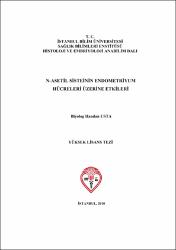N-Asetil sisteminin endometriyum hücreleri üzerine etkileri
Künye
Usta, Handan. (2010). N-Asetil Sisteinin Endometriyum Hücreleri Üzerine Etkileri. Yayımlanmamış yüksek lisans tezi. İstanbul : İstanbul Bilim Üniversitesi, Sağlık Bilimleri Enstitüsü.Özet
Endometriyum, reprodüktif yaşam süresince proliferasyon, diferansiyasyon ve
dejenerasyon gibi periyodik olarak gerçekleşen sikluslara uğrar. Regülasyonu östrojen ve
progesteron steroid hormonlarının kontrolü altında gerçekleşen endometriyum,
yenilenebilen bir dokudur. Östrojen, endomeriyumun epitel ve stromal hücrelerinin
proliferasyonunda önemli rol oynar. Proliferasyon evresinde en aktif olan östrojen
17-β-östradioldür. Progesteron ise proliferasyonu inhibe eder ve desidualizasyonun
düzenlenmesinde görev alır.
Çalışmamızda in-vitro endometriyum modeli olarak Ishikawa hücreleri kullanıldı.
Deney grupları kültür medyumu içerisinde büyütülen kontrol, 17-β-östradiol, 17-β-
östradiol ile birlikte N-asetil sistein (NAS) uygulanan ve yalnızca NAS’ın farklı
konsantrasyonlarda uygulandığı dört gruptan oluşmaktadır. Östradiolün proliferatif etkisi
ve NAS’ın proliferasyon üzerindeki etkileri anti-bromodeoksiüridin (BrdU) antikoruyla
immünositokimyasal olarak değerlendirildi. 17-β-östradiol uygulanan grupta kontrol
grubuna göre S faz proliferasyon oranında anlamlı bir artış tespit edildi. NAS
uygulamasının konsantrasyona bağlı olarak hücre proliferasyonunu azalttığı ve/veya inhibe
ettiği gözlendi. 20 mM ve 50 mM NAS uygulanan deney gruplarında anlamlı düzeyde
proliferasyon inhibisyonu izlendi. Kontrol ve östradiol uygulanan gruplarla
karşılaştırıldığında NAS’ın, nukleus lokalizasyonlu nükleer faktör КB (NF-КB)
ekspresyonunu artırdığı tespit edildi.
Bu bulgular doğrultusunda NAS’ın tanımlanmış olan antioksidan özelliğinin yanı
sıra konsantrasyona bağlı olarak hücre proliferasyonunu inhibe ettiği ve NF-КB’nin ilişkili
gen ekspresyon düzenlemesiyle NAS’ın hücresel etkinliğinde rol oynadığı sonucuna
varılmıştır. Endometrium undergoes a periodic menstrual cycle including proliferation,
differentiation, and degeneration during the reproductive life cycle. Endometrium,
regulated by the steroid hormones estrogen and progesterone, is a tissue that can
regenerate. Estrogen plays an important role in the proliferation of the endometrial
epithelium and stromal cells. During the proliferation phase, 17-ß-estradiol is the most
active estrogen. Progesterone inhibits the proliferation and helps in the regulation of
decidualization.
In our study, Ishikawa cells were used as in-vitro endometrium model. The
experimental groups consist of four different culture mediums; the control, 17-ß-estradiol,
N-acetyl cysteine (NAC) along with 17-ß-estradiol, and different concentrations of NAC.
Anti-BrdU antibody is used for immunocytochemical analysis of the proliferative effect of
estrogen and the effects of NAC on proliferation. A significant increase in the S phase
proliferation rate was in the group treated with 17-ß-estradiol compared to the controls.
The NAC treatment either decreased and/or inhibited the cell proliferation depending on
the concentration. There was a significant inhibition of the proliferation in the
experimental groups treated with 20 mM and 50 mM of NAC. When compared to the
controls and estrogen treated groups, NAC has been found to increase the expression
nuclear factor-.B (NF-.B) in nucleus.
With these findings, it has been concluded that besides having the previously
identified antioxidant effects, NAC inhibits cell proliferation depending on the
concentration and the NF-.B plays a role in the cellular activities of NAC by the
regulation of related gene expression.


















